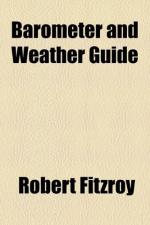|
This section contains 862 words (approx. 3 pages at 300 words per page) |

|
The invention of the barometer, a device to measure air pressure, was a long and arduous process. It required the creation and understanding of a vacuum. Unfortunately one notable philosopher had said a vacuum couldn't exist, and that stalled advancement for centuries. When a physicist accidentally succeeded in creating a barometer, he didn't realize what he had invented! Eventually a third scientist built a barometer and put it to proper use, although he didn't give it its name. Aristotle (384 b.c.-322 b.c.) was the philosopher who said a vacuum could not exist. He correctly believed that the atmosphere had weight, but had no method of measuring it. Galileo disproved a number of Aristotle's claims. In 1638 he published Two New Sciences, in which he stated his belief that a vacuum could exist, but discounted the idea that air had weight and could exert a pressure. About two...
|
This section contains 862 words (approx. 3 pages at 300 words per page) |

|


